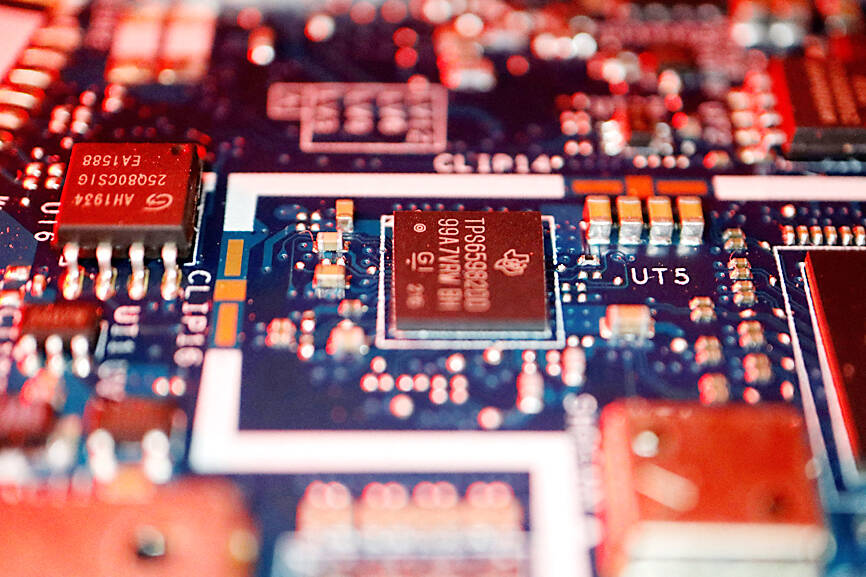Malaysia is to require permits for exports of high-performance US artificial intelligence (AI) chips, suggesting the government is seeking to clamp down on potential diversion of the sensitive components to places such as China.
Effective immediately, people and companies must notify Kuala Lumpur at least 30 days prior to exporting or shipping such hardware, the Malaysian Ministry of International Trade and Industry said yesterday.
They must inform the agency if they know or “have reasonable grounds” to suspect the items would be misused or used for restricted activities, it said.

Photo: Reuters
Malaysia “will not tolerate the misuse of Malaysia’s jurisdiction for illicit trading activities,” it said.
Kuala Lumpur has come under increasing pressure from Washington — which has effectively banned the sale of advanced AI chips to China since 2022 — to halt the suspected flow of those parts to China via intermediaries in Malaysia.
Malaysian authorities in March said that they would tighten regulations on the country’s burgeoning data center industry, which relies on chips from the likes of Nvidia Corp.
The new permit requirements aim to “close regulatory gaps,” while Malaysia “undertakes further review” of the potential inclusion of AI chips to a national list of items covered by the Strategic Trade Act, the ministry said.
Semiconductor sales to Malaysia are also a focal point of a court case in Singapore, where prosecutors charged three men with defrauding customers about the ultimate destination of AI servers — originally shipped from Singapore to Malaysia — that might have contained advanced Nvidia chips.
Malaysia in March said that its investigation into the matter had not uncovered evidence of such shipments, and that the country would continue to monitor for possible fraud.
Nvidia has not been accused of any wrongdoing in Singapore’s investigation.
Malaysia is a key part of the AI supply chain, home to many facilities used for developing and deploying AI models. US companies, including Oracle Corp, are massively expanding their data center footprints in the country, which saw an increase in imports of crucial components this year.
Nvidia CEO Jensen Huang (黃仁勳) has said there was “no evidence” of AI chip diversion, in general remarks that did not touch on any particular country.
Regarding potential US curbs, Malaysian Minister of Investment, Trade and Industry Tengku Zafrul Aziz said it welcomes dialogue with the US and other nations to “clarify any misunderstandings,” while also warning that unilateral restrictions could disrupt legitimate trade and hamper innovation.
The ministry — which, like many others in Asia, is hammering out a trade deal with US officials — added that “all matters related to Malaysia-US bilateral trade are interlinked, each having its own unique role in the current trade negotiations.”

POWERING UP: PSUs for AI servers made up about 50% of Delta’s total server PSU revenue during the first three quarters of last year, the company said Power supply and electronic components maker Delta Electronics Inc (台達電) reported record-high revenue of NT$161.61 billion (US$5.11 billion) for last quarter and said it remains positive about this quarter. Last quarter’s figure was up 7.6 percent from the previous quarter and 41.51 percent higher than a year earlier, and largely in line with Yuanta Securities Investment Consulting Co’s (元大投顧) forecast of NT$160 billion. Delta’s annual revenue last year rose 31.76 percent year-on-year to NT$554.89 billion, also a record high for the company. Its strong performance reflected continued demand for high-performance power solutions and advanced liquid-cooling products used in artificial intelligence (AI) data centers,

SIZE MATTERS: TSMC started phasing out 8-inch wafer production last year, while Samsung is more aggressively retiring 8-inch capacity, TrendForce said Chipmakers are expected to raise prices of 8-inch wafers by up to 20 percent this year on concern over supply constraints as major contract chipmakers Taiwan Semiconductor Manufacturing Co (TSMC, 台積電) and Samsung Electronics Co gradually retire less advanced wafer capacity, TrendForce Corp (集邦科技) said yesterday. It is the first significant across-the-board price hike since a global semiconductor correction in 2023, the Taipei-based market researcher said in a report. Global 8-inch wafer capacity slid 0.3 percent year-on-year last year, although 8-inch wafer prices still hovered at relatively stable levels throughout the year, TrendForce said. The downward trend is expected to continue this year,

Vincent Wei led fellow Singaporean farmers around an empty Malaysian plot, laying out plans for a greenhouse and rows of leafy vegetables. What he pitched was not just space for crops, but a lifeline for growers struggling to make ends meet in a city-state with high prices and little vacant land. The future agriculture hub is part of a joint special economic zone launched last year by the two neighbors, expected to cost US$123 million and produce 10,000 tonnes of fresh produce annually. It is attracting Singaporean farmers with promises of cheaper land, labor and energy just over the border.

A proposed billionaires’ tax in California has ignited a political uproar in Silicon Valley, with tech titans threatening to leave the state while California Governor Gavin Newsom of the Democratic Party maneuvers to defeat a levy that he fears would lead to an exodus of wealth. A technology mecca, California has more billionaires than any other US state — a few hundred, by some estimates. About half its personal income tax revenue, a financial backbone in the nearly US$350 billion budget, comes from the top 1 percent of earners. A large healthcare union is attempting to place a proposal before